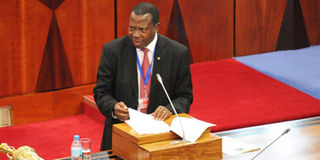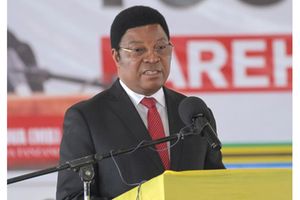Why Mpango should look forward to having it easy

Minister for Finance and Planning, Dr Phillip Mpango
What you need to know:
- Following heated debate on the Sh29.5 trillion budget for the Financial Year 2016/2017, Dr Mpango had several issues to respond to as MPs came down hard on him over a proposal to amend the Income Tax Law with a view to start taxing their (MPs’) gratuity. This was the time when legislators gave themselves all types of gorgeous names to explain their purported open-handedness in the endeavour to cajole Dr Mpango to drop the proposal.
Dodoma. At a time like this last year, the Minister for Finance and Planning, Dr Phillip Mpango, was quite unsettled.
Following heated debate on the Sh29.5 trillion budget for the Financial Year 2016/2017, Dr Mpango had several issues to respond to as MPs came down hard on him over a proposal to amend the Income Tax Law with a view to start taxing their (MPs’) gratuity. This was the time when legislators gave themselves all types of gorgeous names to explain their purported open-handedness in the endeavour to cajole Dr Mpango to drop the proposal.
Last year at a time like this was when Tanzanians heard all the self-glorifying adjectives qualifying the MP title. They described themselves “voters’ ATMs”. They told Dr Mpango that they (the MPs) are always at hand, contributing towards wedding ceremonies of their voters. Dr Mpango was informed that MPs are the ones that normally buy coffins for their departed voters and that they also pay school fees and medical bills for needy students the elderly in their constituencies.
From the following quotes, one would easily notice the situation that Dr Mpango was in during a time such as this last year: “The minister (for Finance and Planning, Dr Phillip Mpango) should not forget that our constituents consider us their ATMs and that we are made to dispense money to them time and again,” said the Mwibara MP on the ruling party’s ticket, Kangi Lugola.
“If you think you are creating enmity between us (MPs) and our constituents, then you are far off the mark. This is because between 50 and 60 per cent of our incomes end up assisting our voters and they are aware of this,” said the Sumbawanga Urban MP on the ruling party’s ticket, Mr Aeshi Hilaly.
And Juma Nkamia (Chemba-CCM) had this to say: “My colleague (referring to Dr Mpango); if you ever try seeking to become an elected MP, you will understand what these gratuities mean to our political lives.” (Dr Mpango is a nominated MP)
With other proposals such VAT on tourism and on financial transaction services; removing tax exemption on disposal of shares listed on the Dar es Salaam Stock Exchange (DSE) and the tiny amount budgeted for the office of the Controller and Auditor General (CAG) among others, last year’s debate was intense.
In apparent reference to such a background, while presenting the 2017/18 Budget in Parliament on Thursday, June 8, 2017, Dr Mpango said he was appointed into that docket in order to receive all manner of insults on behalf of the government.
“President John Magufuli once informed me that he appointed me into this docket so I can be insulted on behalf of the government and I am ready to bear the cross,” he said as he started taking the House through the Sh31.7 trillion budget speech for the FY 2017/18.
And response has been different. Indeed, if the quality of a revenue and expenditure plan is to be measured by the number of praises and endorsements it receives from MPs, then Dr Mpango will be a happy man this week.
The mere proposal to scrap annual motor vehicle registration fees and instead recoup the tax through imposing a Sh40 tax on every litre of petrol, diesel and kerosene in the 2017/18 budget delighted almost everyone in the House.
This was followed by several other measures that seek to promote Tanzania as an investment destination of choice in areas of assembling of vehicles, tractors and fishing boats as well as in several other small and medium-sized economic undertakings. To reduce procurement and importation of capital goods—especially machines and plants used in production—Dr Mpango is also proposing to exempt VAT on capital goods.
Much as some manufacturers, mineral exporters and small scale miners as well as non-profit organisations might remain on the spot as they reap maximum benefits and fill tax evasion loopholes emanating from their operations, it remains a fact that Dr Mpango’s 2017/18 Budget has received more thumbs up than condemnation.
With President John Magufuli’s decision to sustain the ban on exports of gold and copper concentrates dominating budget debate for the whole of last week, one can only hope that Dr Mpango will see the going easy as he winds up his revenue and expenditure plan in the House tomorrow. Besides, some of what would be seen as grievances in the FY 2017/18 budget debate have received positive responses from MPs themselves, turning Dr Mpango into a happy man.
For instance, while those opposing the proposal to impose a Sh40 tax on every litre of petrol, diesel and kerosene believe the move will hit the poor hard, Ms Saada Mkuya (Welezo-CCM), Ahmed Shabiby (Gairo-CCM) and Dr Diodorious Kamala (Nkenge-CCM) have a completely different view.
Ms Mkuya, who was President Jakaya Kikwete’s last Finance Minister, said the government should increase Sh10 more tax on petroleum products so that it (the Sh10) can specifically be spent on water projects in the rural areas.
She said while some people believe the tax will make the cost of living higher to poor Tanzanians, especially those who use kerosene, the fact that over 60 MPs stood up and demanded water for their constituencies during the debate of the budget for the Ministry of Water, is a clear indication that the precious liquid remains scarce across the country and thus the need to increase funds to avail it.
In his remarks, Mr Shabiby, who also owns a transport company, said the Sh40 per litre tax offers a lot of relief to vehicle owners, contrary to assumptions that they will pay more.
He said if someone owns a vehicle for which he would pay Sh250,000 in annualroad licence fee, the same person will now be required to pay a maximum of Sh144,000 per year, putting into consideration the fact that he will need about 10 litres of fuel per day and thus pay Sh400 per day.“In fact, if Dr Mpango was to listen to what we had proposed in this House, he would charge Sh140/litre since we had wanted Sh50 for water, another Sh50 for rural electrification projects plus the Sh40 which is for government projects as highlighted in the budget speech,” said Mr Shabiby.




